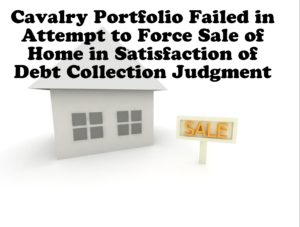By: Robert J. Nahoum
Judgment creditors have a wide variety of devices at their disposal to enforce debt collection judgments. The most common of these are bank freezes and wage garnishments. Another, less common buy far more destructive is the sale of a judgment debtor’s home.
New York law permits a judgment creditor to force the sale of a judgment debtor’s home in satisfaction of a judgment. This judgment enforcement device is seldom used primarily because most judgment debtors who own their homes have outstanding mortgages that come before the judgment creditor making a sale fruitless.
A recent attempt to force the sale of a judgment debtor’s home in satisfaction of a debt collection judgment by infamous junk debt buyer Cavalry Portfolio Services failed because the property was already encumbered by mortgage liens.
Cavalry sued the judgment debtor in the Supreme Court of the State of New York, Suffolk County for an old credit card debt it claimed to have purchased from Chase Bank. After being awarded judgment in the sum of $17,308.41, Cavalry commenced a special proceeding asking the court for an order compelling and directing the sale of the judgment debtor’s home which was appraised to be worth approximately $485,000.
Judge Martin J. Kerins denied Cavalry’s attempt finding that two separate mortgages were “senior†to Cavalry’s judgment lien because they pre-dated the judgment and remained outstanding. Judge Kerin’s noted that Cavalry
“has not demonstrated that the real property exceeds any liens or encumbrances by more than $50,000.00, inclusive of [Cavalry’s] judgment. The facts in the petition do not present a clear picture to support the exercise of the Court’s judicial discretion in favor of [Cavalry]. It is well settled that the Court has broad discretionary power to control and regulate enforcement procedures. […]  Consideration of these factors is warranted in light of the Courts responsibility to minimize the adverse collateral effects that may arise from the use of enforcement procedures. CPLR §5206(e) authorizes a judgment creditor to commence a special proceeding to procure a sale.  However, whether a sale is actually ordered, is a matter of judicial discretion. This discretion must be exercised in light of the importance to the judgment creditor of securing a satisfaction of his judgment, whether there is any possibility that the judgment can be satisfied by other means, the relative monetary value of the property to be sold, the amount of the judgment and the rights of other persons in the property.â€
The sale of a person’s home in satisfaction of a debt collection judgment is a drastic remedy indeed. While Cavalry failed in this case, it and other debt collectors will not necessarily fail in every case. For this reason, debt collection judgments must be taken seriously and immediately dealt with.
If you need help settling or defending a debt collection law suit, stopping harassing debt collectors or suing a debt collector, contact us today to see what we can do for you. With office located in the Bronx, Brooklyn and Rockland County, the Law Offices of Robert J. Nahoum defends consumers in debt collection cases throughout the Tristate area including New Jersey.
The Law Offices of Robert J. Nahoum, P.C
(845) 232-0202
www.nahoumlaw.com
info@nahoumlaw.com

